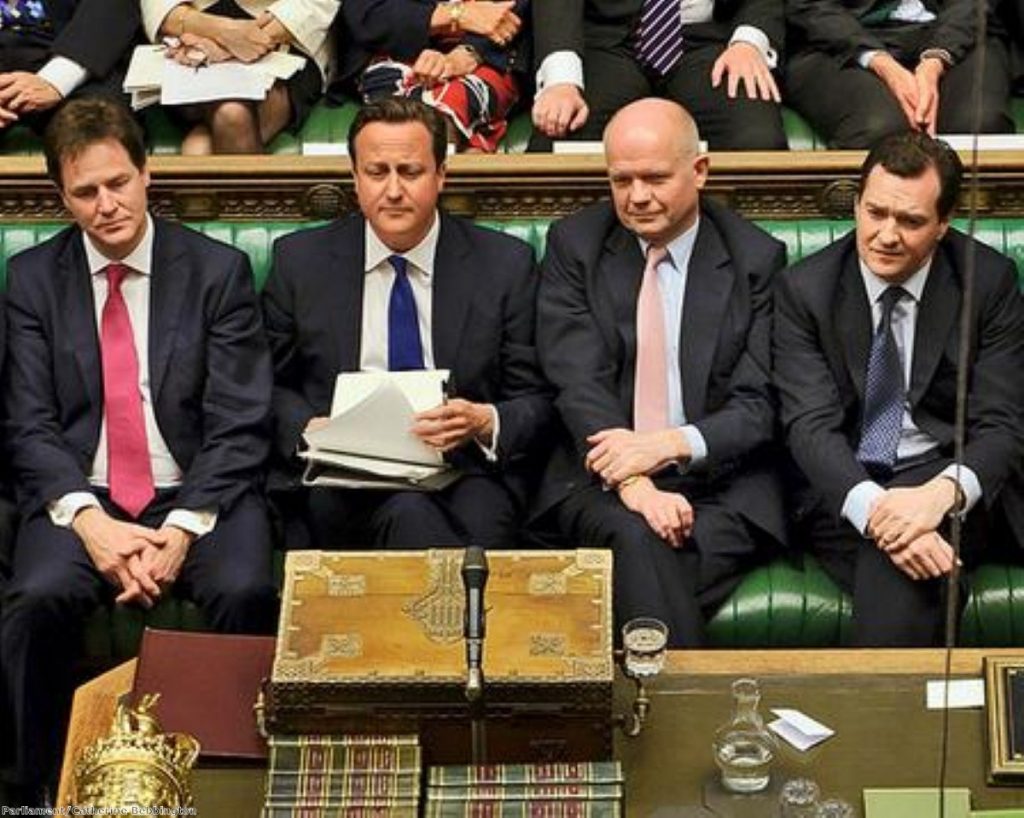Eyewitness: Shock in the Commons
In the middle of the packed Commons chamber yesterday evening a government whip sidled over to his colleague and whispered something in his ear. David Cameron, George Osborne and William Hague were looking on, desperately dulled anxiety showing on all their faces. Then came a smile and a thumbs-up. Relieved little grins broke out here and there as they sat back, relaxed: the government was going to defeat Labour's amendment comfortably.
No-one expected what was about to happen next.
That's because governments just don't lose Commons votes on foreign interventions. It hasn't happened for years, decades, even centuries (depending on which historian you believe). When Cameron returned from voting for his doomed motion on military action against Bashar al-Assad he was joking with Labour frontbenchers. It was the last time he would smile in the Commons chamber that evening.
At some stage in the minutes that followed he was informed of the news. I was watching intently from about 20 feet about his head in the press gallery, but didn't register exactly when this was. There did not seem to be much difference between the attentive, anxious looks that had preceded the previous vote and this time round. The truth is that it's quite easy to sit there and wait patiently without giving anything away.


Which is why, when the moment came, it was electric. I don't know whether my jaw dropped but I can remember a sort of spasmodic jerking of physical shock. Excitable opposition backbenchers screamed "resign!" as soon as the wrong whip stepped forward with the result. Thirty Tories and nine Liberal Democrats had voted with the opposition to hand Cameron the most politically devastating defeat of his career.
MPs' hooting and yelling at David Cameron's defeat shamed parliament, but in the excitement of the moment they can be excused for getting carried away. The life of an opposition MP is a dull and thankless one and they get very few things to be cheerful about. The defeat of the government was definitely one of them, even if they were getting a bit carried away. Some seemed so worked up it was a miracle they didn't fall off the green benches.
The government, lined up on the Commons frontbench late on an August evening when they might have reasonably expected to have been sipping a glass of wine on some Mediterranean island, sat in silent turmoil as the jeers from Labour and, especially, the SNP washed over them. The trio of Cameron, Hague and Osborne sat staring across with intensely blank expressions fixed on their faces. No defeat is as comprehensive as a general election drubbing, and Hague and Cameron have both failed to emerge with an overall majority before. This must have been as close as a Commons defeat comes to that crushing feeling of humiliation from complete rejection by the British people.
About three minutes beforehand the prime minister had been handed a small slip of paper with a few typed paragraphs on it. He studied this, face immovably grave, as the tension grew around him. And it was from these lines that he read out his response at the despatch box. "It is very clear tonight that while the House has not passed the motion it is clear to me the British parliament, reflecting the views of the British people, does not want to see military reaction. I GET that and the government will act accordingly."
That emphasis on the 'get' was supposed to be affirmative but it sounded bitter, or angry, or both.
MPs couldn't believe what they had just seen: a bigger victory for parliament over the executive than many have ever seen before in their political careers. Jack Straw, a key player in the Iraq War which has created the war weariness behind last night's result, said Cameron only had "miscalculations" to blame. Some Tory MPs were less charitable: their leader was "weak" and it was his personal failings which were responsible for this debacle. Others were genuinely dismayed by the result.
As MPs tottered off for the evening the atmosphere of excited disbelief continued to disseminate. One disbelieving Lib Dem rebel, who had predicted just him and four others would vote against Nick Clegg, seemed to have his eyebrows permanently raised. "There must have been more of us," he shrugged. It was Labour's MPs who were most delighted, though, as they trundled their suitcases out of parliament and towards the tube. "He'll have to ring Obama and tell him it's off!" one chuckled down the phone. "This changes everything."

